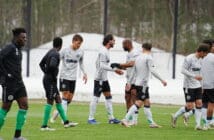There are some deeper lieing issues arising from Michel Platini’s announcement that games in EURO2012 can be stopped if racist chanting is heard.
International football is a very different animal from club football and chants by their very nature, can point to cultural differences, and more troublingly past conflicts, between nations.
Michel Platini’s statement that referees can halt games due to racist chanting is o be welcomed as a sign that UEFA takes the matter seriously, but the implementation of the policy raises detailed questions.
Racism from crowds takes more than one form.
The ignorant booing or catcalling of players of colour is the most obvious and sickening manifestation of this. If it starts at the opening whistle, it is clear cut. Vile, racist, neanderthal but most of all easily recognisable as racism.
However, if a player does something on the pitch to illicit crowd discontent, for example a bad tackle or persistent diving, and the crowd starts to barrack him, is the referee is now charged with deciding on the motivation for the crowd reaction?
Secondly, any racist chanting from home fans is likely to be in Polish or Ukrainian.
Few referees will understand it. They are therefore reliant on UEFA observers in the crowd to alert them, presumably a Polish or Ukrainian delegate who would have to be prepared to bring instant shame to his own countrymen.
UEFA have countered this fear by inviting the Football Against Racism in Europe (FARE) network to help select a group of 31 expert spotters who will be charged with monitoring every team’s fans for any banners, chants and behaviour inside stadiums which breach UEFA’s zero-tolerance anti-discrimination policy.
That’s quite an amount of power now in a few hands and is clearly subjective. As anyone who’s ever been to an Old Firm match in Glasgow will tell you, one man’s bigoted drivel is another man’s righteous expression of heritage.
That problem becomes even more difficult to discern at international level when pointing out and over emphasising differences in national characteristics are part of the chanting culture.
The Netherlands v Germany rivalry is a fine example.
A favourite Dutch chant when playing Germany is “Give us back our bicycles”.
It refers to World War II when the Germans confiscated all the bicycles in Holland after the Nazi occupation in 1940. Relevant? Doubtful. Racist? Probably not.
In 1988, the Republic of Ireland played England in Stuttgart in this very tournament.
Some of the chanting that went on that day at the Neckarstadion was profoundly politically incorrect at both ends. And definitely racist.
However, it would have been hard to find a fan on either side who was really offended. We’ve been lobbing this stuff at each other for millennia.
In other cases, emotions are far rawer.
Fears are already arising about the march of 30,000 Russian fans in Warsaw prior to their game against hosts Poland and the likely Polish reaction to such an ostentatious display of Russian nationalism in the heart of their capital city.
By the time everybody is in the stadium, emotions will be very high indeed.
Someone must decide at each game, whether any individual chant breaches the guidelines.
The Dutch have been doing the bicycle chant for over 50 years. The Germans have pretended not to be offended.
Now one FARE delegate sitting at the stadium could rule otherwise. One only hopes they all have a very deep understanding of the relative political, historical and football cultures of all sides involved.
Then there is the mire of Balkan politics. Where does a legitimate expression of national identity stop and racism begin?
Croatian fans brought a fine upon their national association four years ago for neo-Nazi banners waved against Turkey. Croatia have qualified again. But a fine leveled after the tournament is a very different proposition to halting or even abandoning a game.
The stakes are high.
If a FARE delegate makes such a call, then the story will be viral and worldwide instantly. It will overshadow the match and perhaps even the entire tournament. One would assume they wil have to be very very certain to make such a move.
Thirdly, this move does give racist thugs the power to stop the tournament and draw massive attention to their views.
While always cloaking themselves in the icons of their country, racists are rarely concerned about the opprobrium their extreme views and vile behaviour bring to their own nation.
One fears that the chance of stopping a match will prove as much a carrot as a deterrent to these morons, as it was to decades of hooligans before, even as recently as October 2010 at an Italy v Serbia at a qualifier for this very tournament.
It is of course the overriding hope that football and footballers make the headlines in EURO2012.
However in awarding the games to countries where the tackling of racism at matches is still in its relative infancy, UEFA has taken a risk.
Racist Chanting to Stop Games at EURO2012
![Prost International [PINT]](https://prostinternational.com/wp-content/uploads/2021/08/PINTtFontLogoRoboto1536x78.jpg)



2 Comments
You bring up some fascinating points. Great piece.
And that was a fantastic comment! My favourite type.
Seriously though, it would be easier if the answers to this issue were simple not nuanced.